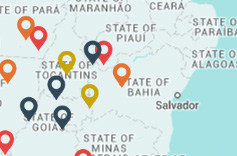Religious Studies Institute – Iser
Combat the human rights violations resulting from the abuse of the provisional detainment regime in the Brazilian criminal justice system
Rio de Janeiro
Objetivos e público prioritário
Producing innovative and qualified knowledge and generating pedagogical materials for campaigns and public debates on the issue of provisional detainment. The proposal includes a research project to deepen the public debate on the theme, from the perspective of contributing to a less repressive and punitive outlook. The institute intends to map the implementation of cautionary measures in Rio de Janeiro and make recommendations that might aid the Judiciary in the application of penalties and sentences.
Main activities
– Identification and elaboration of the life stories of twenty individuals who have suffered the abuse of provisional detainment;
– Study on sentencing alternatives in the state of Rio de Janeiro;
– Sample research on the application of cautionary measures in the capital city of Rio de Janeiro;
– A seminar and production of sensitivity materials (videos and pamphlets).
Context
In Brazil, provisional detainees represent around 35% of the total inmate population – about 195,000 people. In Rio de Janeiro the proportion is a little higher and corresponds to 39% of inmates. The presumption of innocence in legal practice depends more on sociability, legal assistance and buying power and less on one’s condition as a citizen. The punishment is established, without degrees, purely in accordance with the logic of confinement and dehumanization.
As if that disrespectful context weren’t enough, the Cautionary Measures Law, sanctioned in 2011, would increase the judiciary’s ability to make incarceration a more exceptional measure, however in practice the Brazilian prison system changed little. According to a study by the Center for Studies in Security and Citizenship (Cesec), in Rio de Janeiro approximately 80% of the measures applied still involve imprisonment. In cases involving theft and drug trafficking, the rate of incarceration is nearly absolute. Furthermore, the force of the culture of incarceration sabotages efforts in the field of alternative sentencing and innovative practices, eventually produced in the justice system. To complete the hegemonically punitive scenario, the Ministry of Justice favors the implementation of an electric monitoring system as a control and stigmatization mechanism. In the wrong-headed view of the equivalence between this practice and actual alternative sentencing, the latter will have little chance at resisting the political pressure for the widespread adoption of the technological solution and, especially, the reduced visibility of alternatives.
About the organization
Iser is a civil society organization committed and dedicated to the causes of human rights and democracy. As the quality of its research, studies, training and publications attest, it has developed the ability to promote dialogue between different spheres such as social movements, academia, civil entities and state organisms. With the proposal to contribute to the discussion and formulation of public policies, its current areas of interest and action are: religion, environment, youth, civil society, violence, gender and conflict resolution. In its strategic planning for 2014/2016, the prison system is a highly relevant priority theme.
Partnerships
The project will be developed in partnership with the Center for Studies in Security and Citizenship (CESEC).
Results
The project brought together, by means of social memory research, studies and available data on provisional detentions in Rio de Janeiro. This material was made available to civil society, justice and media institutions, with the objective of disseminating the content and reflections on the dynamics and consequences of mass incarceration and the alternatives for reversing this picture. The project made it possible to continue discussions on preliminary hearings and to reinsert into the agenda discussions on alternatives to incarceration. The life stories that were reported and published brought the human dimension of the system to the fore. Debates and collaborations with several actors linked to the issue are also actions stemming from the project.
Funding Line
Criminal Justice / Rio de Janeiro e São Paulo (2014)
Year
-
Total Granted
R$ 471,000
Duration
18 months
Main Themes
Guaranteeing the rule of law and criminal justice






